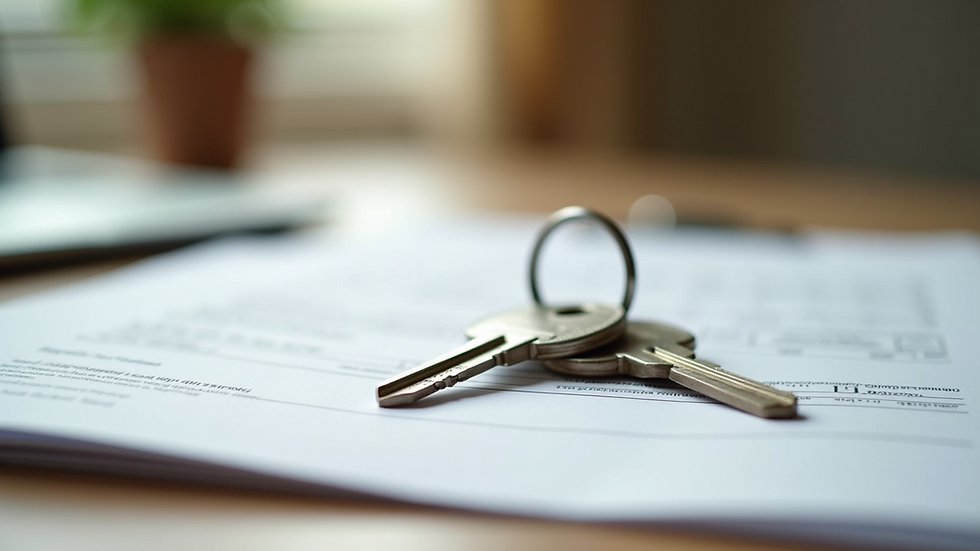Essential Tips for First-Time Home Buyers
- Karen O'Neil
- Jul 14, 2025
- 4 min read
Purchasing your first home is an exciting yet daunting venture. With so many things to consider, from financing to closing deals, it’s easy to feel overwhelmed. However, with the right information and strategies in hand, you can navigate this journey successfully. In this blog post, we’ll share essential tips for first-time home buyers that will help you make informed decisions.
Understanding Your Budget
Before you start house hunting, it’s crucial to understand your budget. Knowing how much you can afford will guide your search and prevent you from falling in love with homes that are out of your reach.
Calculate Your Income and Expenses: Start by analyzing your monthly income and current expenses. Include every detail from groceries to entertainment. Use this information to create a monthly budget.
Determine What You Can Afford: A general rule for home buying is that your monthly mortgage payment should not exceed 28% of your gross monthly income. Use online mortgage calculators to see how different home prices will affect your budget.
Account for Hidden Costs: Remember to factor in additional costs such as property taxes, insurance, maintenance, and potential homeowners association (HOA) fees. These costs can add up quickly, so it’s essential to consider them in your financial planning.

Beginner Home Buying Guide
Once you have a clearer understanding of your budget, it's time to dive into the home buying process. Here are important steps that every first-time home buyer should follow:
Get Pre-approved for a Mortgage: Before you start looking at homes, get pre-approved for a mortgage. This step will give you a clear idea of how much money a lender is willing to loan you. Pre-approval can also help you stand out as a serious buyer when you make an offer.
Research Neighborhoods: Define your priorities for neighborhood features such as schools, amenities, and commute times. Research areas where you’d like to live, and visit these neighborhoods to get a feel.
Find a Trustworthy Real Estate Agent: A knowledgeable real estate agent can make a significant difference in your buying experience. Look for someone with a solid track record and good reviews from past clients. They can help you navigate the market, set offers, and even negotiate terms.
Make a Wish List: Create a wish list of features you desire in your new home. Prioritize them according to your needs and wants. It can be helpful to differentiate between 'must-haves' and 'nice-to-haves.'

House Hunting Tips
Now that you’re ready to start searching, keep the following tips in mind:
Visit Multiple Homes: Don’t settle on the first house you like. It’s essential to visit various properties to get a sense of what’s available in your price range and what you can expect.
Open Houses: Attending open houses is a fantastic way to explore homes without making an appointment. This no-pressure environment lets you walk around and get a sense of the home's condition and layout.
Take Notes: After visiting several homes, it’s easy to forget the details. Take notes and photographs (without showing any faces or hands) to help you remember each property.
Review the Inspection: Always have a home inspection done before finalizing your purchase. A qualified inspector will identify any problems that may need addressing before you close the deal.
Don’t Rush the Process: While it’s generally recommended to buy a house during a particular season, take your time when making your selection. Finding the right home is worth the effort, so be patient.
The Offer and Closing Process
Once you’ve found your dream home, it’s time to make an offer. Here are some vital steps to consider:
Making an Offer: Your real estate agent can help you draft an offer that’s competitive yet fair based on market analysis. Be prepared to negotiate on price and terms.
Escape Clause: Including an escape clause in your offer can provide you with an avenue to back out if the inspection reveals serious issues or if financing falls through.
Closing Papers: Before closing, you’ll need to review all closing documents carefully. Ensure you understand all fees and terms involved in the process. Consider consulting your agent or a lawyer if you have doubts.

Moving into Your New Home
Congratulations! You are now a homeowner. However, the journey doesn’t end here. Here are a few important tips for settling in:
Budget for Moving Costs: Factor in the cost of hiring movers or renting a truck for the move. Buying boxes and packing supplies can add to costs as well.
Changing Utilities: Make sure to set up or transfer all utilities, including electricity, water, internet, and gas, to your new address at least two weeks before your move-in date.
Home Safety: Once you move, change the locks on all entry points to ensure your safety. Also, get familiar with all safety features, such as smoke detectors and fire extinguishers.
Explore Your Neighborhood: Take time to familiarize yourself with your new community. Identify nearby grocery stores, parks, schools, and other amenities that can make your life easier.
Connect with Neighbors: Building relationships with your neighbors can make your transition smoother. Consider hosting a small gathering to introduce yourself and learn about the community.
Navigating the challenges of buying your first home can seem overwhelming, but with diligent research and preparation, you can find the perfect place for you and your family. Remember, investing in a home is not just about the property itself; it’s about creating memories and establishing roots in your community. For more information on starting your search, check out this first time home buyer guide. Happy house hunting!



Comments